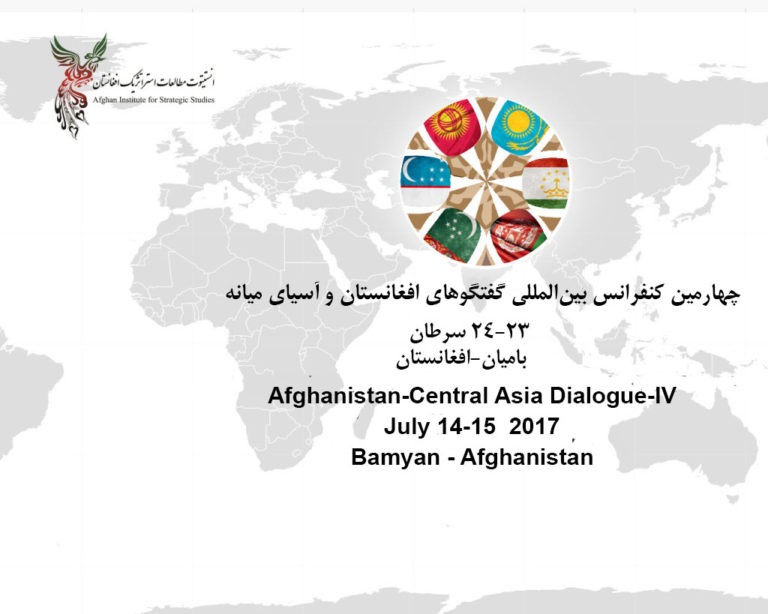Afghanistan-Central Asia Dialogue (ACAD-IV)
4th Afghanistan-Central Asia Dialogue (ACAD-IV)
Nexus of “Geo-politics” and “Terrorism”
14-15 July 2017-Bamiyan, Afghanistan
While an old phenomenon, “terrorism” has become the most prominent political-security discourse of the new century. Since the terrorist attacks of 9/11, 2001, terrorism has engulfed many countries and with significant economic, political and social implication for the international community. The spread of terrorism, however, has not been followed by intellectual understanding and/or political consensus on the cause(s) of terrorism and effective anti/counter-terrorism terrorist strategies. Despite the calamity of terrorism and its global reach, divergent political aims and approaches have prevented a global consensus and hence a global alliance against this menace. The “Return of Geopolitics” to the international politics is the latest development and addition to an already crowded scene of “global war against terrorism”.
Two regions of West Asia and Central Asia have now become the battlefields for terrorists and contested scenes for the “great game” of competing regional and global powers. Since the collapse of the Taliban regime in late 2001 and the invasion of Iraq in 2003, the ongoing struggle against terrorism has been accompanied by the emergence of new political developments and concepts, such as “Arab Spring& Winter”, “ “Shiite Crescent”, “Neo-Ottomanism”, “Reawakening of the Russian bear”, “Muslim NATO”, “One Belt One Road Initiative” , the rise of “Daesh/IS”, “Brexit” ,“Obama’s Retrenchment” and “Trump’s America First”. Afghanistan and its northern neighbors have been affected by these new developments, though with different degrees of intensity and scope.
The fourth Afghanistan-Central Asia Dialogue (ACAD-IV) aims to provide an opportunity for the expert and policy communities to discuss how these geo-political developments have impacted their struggle and vulnerability against terrorism. During six working panels a number of issues, including the following ones will be discussed by speakers from Afghanistan, Central Asian States, wider regions and regional/international organizations:
-
How Afghanistan and Central Asian States view evolving geopolitical developments?
-
What are the characteristics of the new “Great Game”?
-
Is terrorism fueling the new “Great Game” or has terrorism camouflaged the new “Great Game”?
-
What would be the implication of utilization of terrorism as a tool of “Great Game” for the region’s stability and development?
-
Can fighting terrorism unite the competing powers as fighting fascism united the Soviet and the Western World during the Second World War?
-
Can the fear of “Syrianization of Afghanistan” provide an incentive for the competing powers to work for a stable and normal Afghanistan? If so, how?
-
Is there any role for regional organizations to promote political consensus on “terrorism” and prevent another cycle of “great game” in the region?
-
What are indigenous narratives and initiatives for anti/counter radicalization/terrorism?
-
What is the state of regional & international cooperation and mechanism in fighting terrorism?
For those interested to deliver a presentation/paper related to the theme of the conference, please submit the abstract of your paper by 30 May, 2017 to the conference cell. The authors of accepted articles will be invited to the conference.
Afghanistan and five Central Asian Republics of Turkmenistan, Uzbekistan, Tajikistan, Kyrgyzstan and Kazakhstan share common security, economic and cultural space and system. Since 2001, there has been noticeable improvement and increase in interaction, exchange, connectivity and cooperation between Afghanistan and its northern neighbors. However, despite the recent gains and geographical proximity, there remains a significant gap between Afghanistan and the Central Asian Republics’ potential for cooperation and the current state of affairs.
The Dialogue aims to identify the reason(s) for the gap between the potential and actual state of cooperation and to recommend effective ways and policies for strengthening cooperation and connectivity between Afghanistan and the Central Asia. It will bring together prominent experts from Afghanistan, the Central Asian Republics and a selected number of prominent regional and international experts to share their views on the issues of mutual concerns and interests.
The relevant representatives from the Afghan Government, the Central Asian Republics’ ambassadors to Kabul and a selected representative from the concerned regional and international organizations and governments will also be invited to observe the deliberations.
It is envisioned to disseminate the report of the Dialogue to broader audiences in the region and beyond in order to enable policymakers to devise appropriate measures to enable and strengthen the process of regional cooperation and integration.
The Dialogue aims to become a regular forum between the expert and policymaking communities of Afghanistan and the Central Asia Republics to pave the foundation for establishing a Cooperative Security, Economic and Cultural community between Afghanistan and the Central Asia.
Anticipated Participants
Afghanistan: (Government, Parliament, Political Parties, Civil Society, High Peace Council, Private Sector, Media, Academia)
Central Asian Countries: Turkmenistan, Uzbekistan, Tajikistan, Kazakhstan, Kyrgyzstan
Extended Neighbors: Russia, Turkey, China, India, Iran, Pakistan
Wider Partners: USA, Germany, France, UK, Australia, Norway, Sweden
International Organizations: Various International Organizations and Representatives

